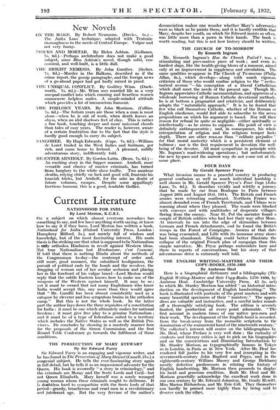THE CHURCH OF TO-MORROW - By Kenneth Ingram
Mr. Kenneth Ingram's Has the ,Church Failed-Rs, Was a stimulating and provocative piece of work ; and even its hardest slaps, like the health-giving blows of a masseur, aimed only at an improvement in suppleness and circulation. The same qualities re-appear in Thi Chitith of T6-morrow (Philip Allan, 6s.), which-- develops—along with much vigorous criticism of those who Would confine .religion to the " eccles- iastical avenue "—his conception of a liberal Catholicism which shall meet the needs of the present age.. Though Mr. Ingram appreciates Catholic saerarnentalism, and approves of a wholesale borrowing of Roman Catholic devotional Methods, he is at bottom a pragrnatist and relativist, and deliberately adopts the "naturalistic approach." It is to be feared that few who call themselves 'Catholic, whether of the Reiman or English obedience,- would feel able to subscribe to the seven propositions on which his argument is based. Nor, will their reason for refusal be quite so negligible—either spiritually or intellectually—as he seems to suppose. His point of view is definitely anthropocentric; and, in consequence, his whole interpretation of religion and the religious temper lacks depth. There are other mescals than "celibate prejudice" tbr that moral austerity which is a persistent element ol holiness ; nor is the first requirement in. devotion- the well- being of the devotee. - All must sympathize in principle with Mr. Ingram's road,widening operations ; but unfortunately the new by-past and the narrow way do not come out at the same place.








































 Previous page
Previous page